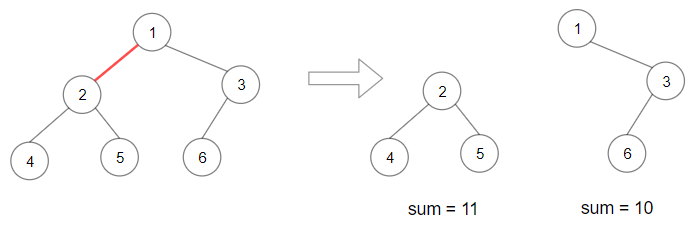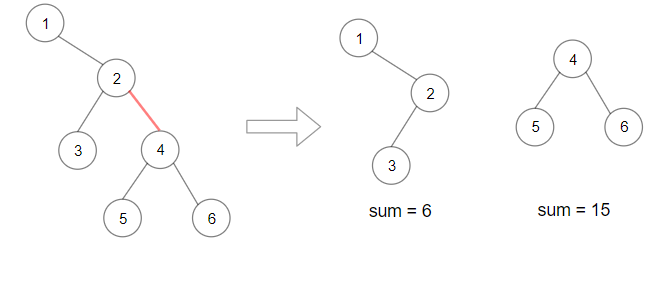Maximum Product of Splitted Binary Tree
Created: April 2, 2020 by [lek-tin]
Last updated: April 2, 2020
Given a binary tree root. Split the binary tree into two subtrees by removing 1 edge such that the product of the sums of the subtrees are maximized.
Since the answer may be too large, return it modulo 10e9 + 7.
Example 1

Input: root = [1,2,3,4,5,6]
Output: 110
Explanation: Remove the red edge and get 2 binary trees with sum 11 and 10. Their product is 110 (11*10)
Example 2

Input: root = [1,null,2,3,4,null,null,5,6]
Output: 90
Explanation: Remove the red edge and get 2 binary trees with sum 15 and 6.Their product is 90 (15*6)
Example 3
Input: root = [2,3,9,10,7,8,6,5,4,11,1]
Output: 1025
Example 4
Input: root = [1,1]
Output: 1
Constraints:
- Each tree has at most 50000 nodes and at least
2nodes. - Each node’s value is between [
1, 10000].
Solution
# Definition for a binary tree node.
# class TreeNode:
# def __init__(self, x):
# self.val = x
# self.left = None
# self.right = None
class Solution:
def maxProduct(self, root: TreeNode) -> int:
MOD = 10**9 + 7
total = self.dfs(root)
self.maxProd = 0
self.dfs(root, total)
return self.maxProd % MOD
def dfs(self, root, total=None):
if not root:
return 0
subtotal = self.dfs(root.left, total) + self.dfs(root.right, total)+root.val
if total != None:
print(total, self.maxProd)
self.maxProd = max(self.maxProd, subtotal*(total-subtotal))
return subtotal